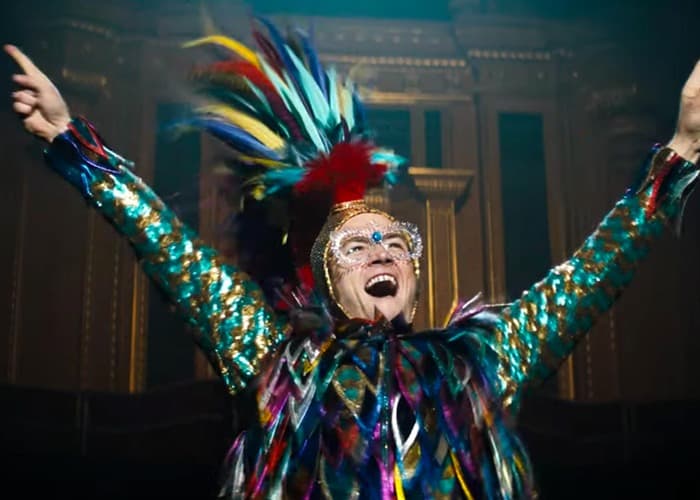
Will the studio system ever learn how to make a decent music biopic? Dexter Fletcher’s Rocketman is another laughably clichéd attempt to tell the story of an all-timer whose life is unquestionably more intriguing and unique than the film depicting it, much like last year’s Bohemian Rhapsody, which Fletcher stepped in to finish after director Bryan Singer was ousted. Why should we be content believing that all the brilliant musicians portrayed in biopics had the exact same lives, filled with slightly tweaked versions of the same mansions, conservative fathers, disapproving mothers, drugs, bouts with depression, blow-ups at parties, and neatly fashioned conclusions?
Rocketman follows the life of Elton John (Taron Egerton) from childhood — when he was still Reginald Dwight — to stardom to sobriety, dragging the audience along through its formulaic fantasy one platitude at a time. He grows up in suburban England with an out-of-control mother (Bryce Dallas Howard), a loving grandmother (Gemma Jones), and a masculine father who hates him (Steven Mackintosh). But he channels his emotion into his piano lessons. Soon, he’s at an elite music academy. Shortly after, he discovers rock n’ roll and becomes a backing piano player for an American soul band touring the UK.
Enter: Bernie Taupin (Jamie Bell), the lyricist behind Elton John’s melodies. They get a record deal, John puts on a spectacular performance at The Troubadour in LA, and the next thing you know he’s hitting the top of the charts. Rolling in booze, cocaine, and glamour, John is constantly bottoming out and waking up in whatever city he doesn’t know he’s in next. Along comes John Reid (Richard Madden), maverick manager and one of John’s first same-sex lovers.
From there, the film continues in a similar vein through John’s rocky career as a drug and sex addict stunning the world with number one hits. There’s a lot of arguing, drinking, friendship exterminating, and irresponsible decision-making. When it comes to dialogue, someone ought to check past music biopic screenplays for legitimate plagiarism. Or perhaps, one could just watch the 2007 comedy Walk Hard: The Dewey Cox Story, a parody of this tedious brand of rock star biopic that is so shockingly similar to Rocketman, you’d think Fletcher and company might just be messing with us.
Seeing as Walk Hard is a parody of the cliches found her, it’s certainly not a compliment to compare them. But the parallels are impossible to avoid. From the spiteful father to the corny record label audition to the wild nights spent popping pills and boozing to rehab, it’s almost all there. Walk Hard speaks explicitly and literally about what films like Rocketman do, and as such, it points out the boring absurdities that drag so many of them down.
For example, it turns the spiteful father into an overly cruel parent who consistently tells his son that “the wrong kid died.” While John didn’t have a dead brother, and his father never says these exact words, his every scene emanates them, especially when John meets him later in life and he has two boys whom he shows plenty of affection. Rocketman merely differs by trying to hold the explicit nature of those “wrong kid” words at bay. Likewise, John tells Bernie off on a couple of occasions, as is a tradition for the rock star to do with their longest, most loyal collaborators or loved ones. Walk Hard mimics this stuff in several ways, most notably when Dewey Cox lambasts his wife as she leaves with their children, shouting that she can take everything as long as she leaves him his monkey, highlighting the silly cliché of prioritizing literally everything over loved ones.
When it comes to character development, no one but John is more than a shell of an archetype, and that’s certainly not to say that he isn’t an archetype himself, point and case being the hacky refrain he repeats to his father and other meaningful figures, “When are you going to give me a hug?” It elicits a cringe every time. There’s just a tad more depth to him as the central figure, though. That’s thanks to Egerton, who puts on an energetic show for his audience like a pro. The role is cheesy and predictable, but he manages to make interesting choices as a performer, much like John himself. This is only one of a couple things the film has going for it, the other being costumes. They’re small benefits when considering the slog of the film as a whole, but they give you something to be entertained by throughout the cloyingly familiar feature.
Costume designer Julian Day probably deserves the most credit out of anyone who worked on the film. Every outfit John wears is magnificent and historically accurate, as the side-by-side photos in the credits point out. From bedazzled baseball uniforms to devils with wings to profligate peacocks, the extravagance of every ensemble is marvelous enough to belong in a museum exhibit.
There’s a version of Rocketman that follows a similar narrative trajectory but takes creative storytelling risks in hopes of achieving an original film. Todd Haynes’ I’m Not There, Milos Forman’s Amadeus, and Oliver Stone’s The Doors are all great examples of this originality. They venture into the narrative and artistic unknown in order to be memorable and genuine through unconventional means. This one is, instead, unapologetically a carbon copy of the rest, a forgettable saga of an unforgettable man. It’s a shiny, sterile, generic wannabe musical biopic that clearly values truisms over substance, and even the style isn’t enough to make it worth watching.
Related Topics: Bohemian Rhapsody, Cannes 2019, Dexter Fletcher, Rocketman, Taron Egerton

